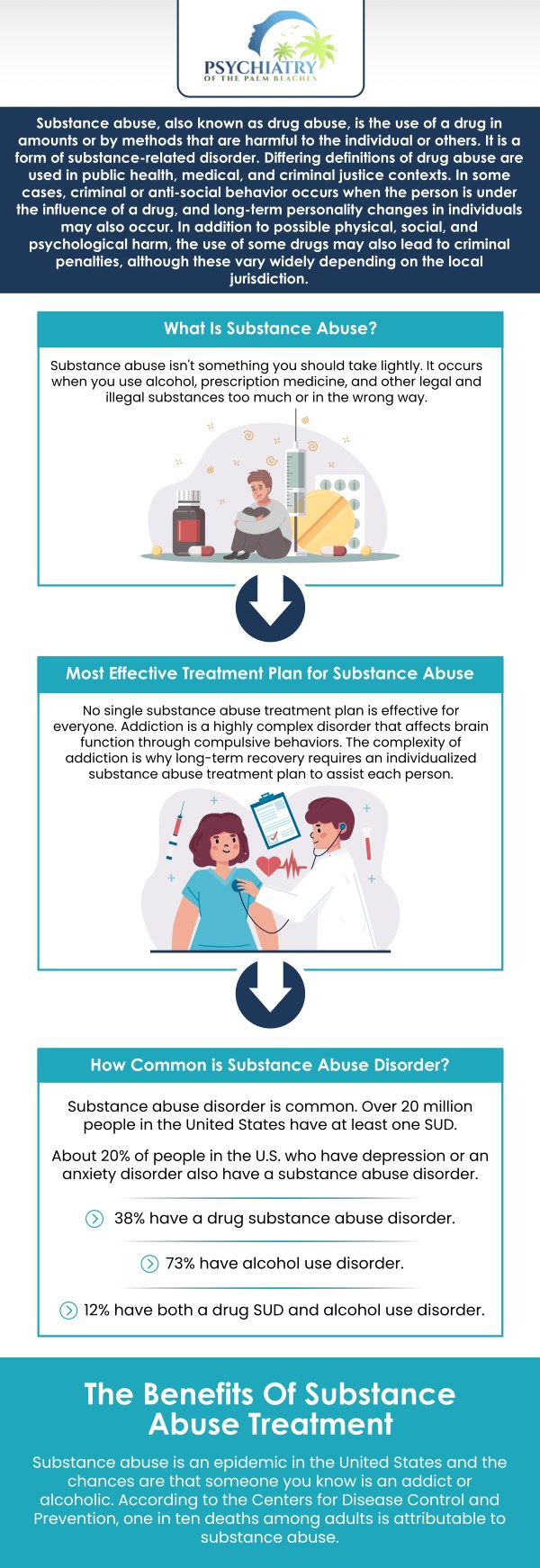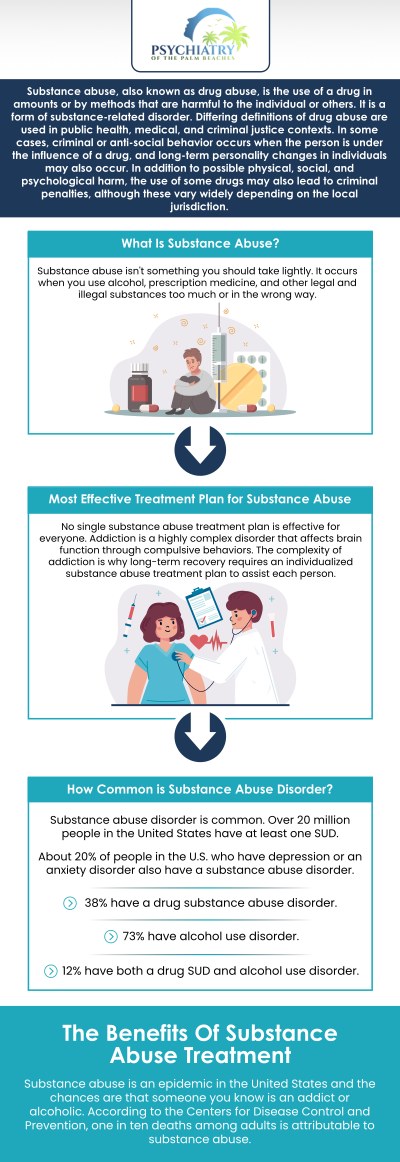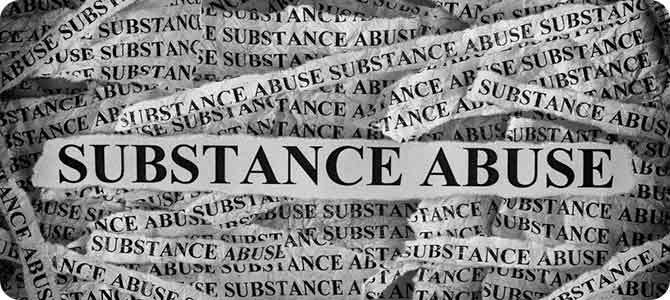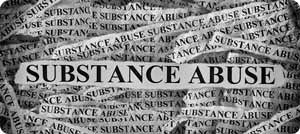Substance Abuse Disorder Treatment Clinic
Substance use disorder is the medical term for a pattern of substance (drug) usage that produces severe issues or suffering. If you need support recovering from a substance abuse disorder, the professional team at Psychiatry of the Palm Beaches would be happy to help. For more information, contact us or book an appointment online. We have convenient locations to serve you in Jacksonville, Boynton Beach, Palm Beach Gardens, Stuart, Royal Palm Beach, Port St. Lucie, Melbourne, Fort Lauderdale, and Jupiter, FL.




Table of Contents:
What are some substance-related disorders?
What are the symptoms of substance-related disorders?
What kinds of interventions and treatments for substance use disorders are most effective?
Substance-related disorders, also known as substance abuse disorders, are a group of conditions that are characterized by the continued use of drugs or alcohol despite detrimental consequences. These disorders can significantly impact a person’s physical and mental health, as well as their relationships, work, and personal life.
Substance-related disorders, also known as drug or alcohol disorders, are a group of conditions that affect a person’s ability to control their use of a particular substance. They are generally characterized by addiction, or the compulsive use of drugs or alcohol despite negative consequences, and include common substance-related disorders such as:
• Alcohol use disorder. Excessive and persistent drinking leads to physical and mental health problems, social and workplace issues, and other negative consequences.
• Opioid use disorder. Addiction to prescription painkillers or heroin leads to physical dependence, overdose, and other serious health risks.
• Stimulant use disorder. Addiction to drugs such as cocaine or methamphetamine leads to physical and mental health problems, violence, and other negative consequences.
• Cannabis use disorder. Excessive and persistent use of marijuana leads to poor academic, social, and vocational outcomes, as well as legal problems.
• Sedative, hypnotic, or anxiolytic use disorder. Addiction to prescription medications such as sleeping pills, sedatives, and anti-anxiety drugs leads to physical dependence, overdose, and other serious health risks.
• Tobacco use disorder. Addiction to nicotine leads to physical dependence, cancer, lung disease, heart disease, and other serious health problems.
The symptoms of substance-related disorders can vary from person to person and depend on the specific substance being used. However, some common signs of substance-related disorders include:
• A strong desire or urge to use a substance.
• Difficulty controlling the amount or frequency of substance use, including unsuccessful attempts to cut back and/or quit.
• Withdrawal symptoms when not using the substance, including sweating, tremors, and nausea.
• Tolerance means that more of the substance is needed to achieve the desired effect.
• Continued use despite negative consequences, such as losing a job or getting into legal trouble.
• Spending a considerable amount of time obtaining, using, or recovering from substance use.
• Neglecting hobbies and activities that were once enjoyed.
• Engaging in risky behaviors when under the influence of a substance, such as driving impaired or having unprotected sex.
• Experiencing problems in relationships with family, friends, and coworkers as a result of substance use.
• Developing physical health issues, such as liver or lung damage, as a result of repeated substance use.
It’s important to note that not everyone who uses drugs or alcohol will develop a substance-related disorder; however, if you’re experiencing one or more of the symptoms listed above, it’s crucial to seek professional help.
While there are a variety of different interventions and treatments available for substance use, research has shown that certain approaches are particularly effective.
One of the most widely studied and successful interventions for substance use disorders is cognitive-behavioral therapy (CBT). CBT is a form of psychotherapy that focuses on identifying and changing negative thought patterns and behaviors. In the context of substance use, CBT can help people recognize the triggers and stressors that contribute to their substance use and develop coping skills to manage those challenges without using drugs or alcohol.
Another effective treatment approach for substance use disorders is medication-assisted treatment (MAT). MAT involves the use of medications like methadone, buprenorphine, or naltrexone to manage withdrawal symptoms and reduce the cravings associated with addiction. These medications are often coupled with supportive therapies like counseling or behavioral therapy to help individuals stay focused on their recovery goals.
In addition to these two types of intervention, there are a variety of other treatments that have shown efficacy in helping patients recover. These may include group therapy, support groups like Alcoholics Anonymous or Narcotics Anonymous, family therapy, and holistic therapies like yoga, meditation, or acupuncture.
At Psychiatry of the Palm Beaches, we provide the professional support that you need to overcome your substance use disorder. Contact us today for more information about our available services or book an appointment online if you’re ready to speak to one of our experienced and knowledgeable specialists. We serve patients from Boynton Beach FL, Delray Beach FL, Palm Beach Gardens FL, Jupiter FL, Stuart FL, Palm City FL, Royal Palm Beach FL, Wellington FL, Citrus Ridge FL, Jacksonville FL, Riverside FL, Port St. Lucie FL, Beau Rivage West FL, Melbourne FL, Palm Bay FL, Fort Lauderdale FL, Hollywood FL, Jupiter FL, North Palm Beach FL, and surrounding areas.
Check Out Our 5 Star Reviews



Additional Services You May Need
▸ Mental Wellness
▸ Relationship Coaching
▸ Depression and Mood Disorders
▸ Women’s Health
▸ Panic Disorder
▸ Medications Management
▸ Men’s Health
▸ Individual Psychotherapy
▸ Bipolar
▸ ADHD
▸ Geriatric Mental Health
▸ Couple’s Counseling
▸ Obsessive Compulsive Disorder
▸ Social Phobia Treatment
▸ Eating Disorders
▸ Post Traumatic Stress Disorder
▸ Psychotic Disorders


